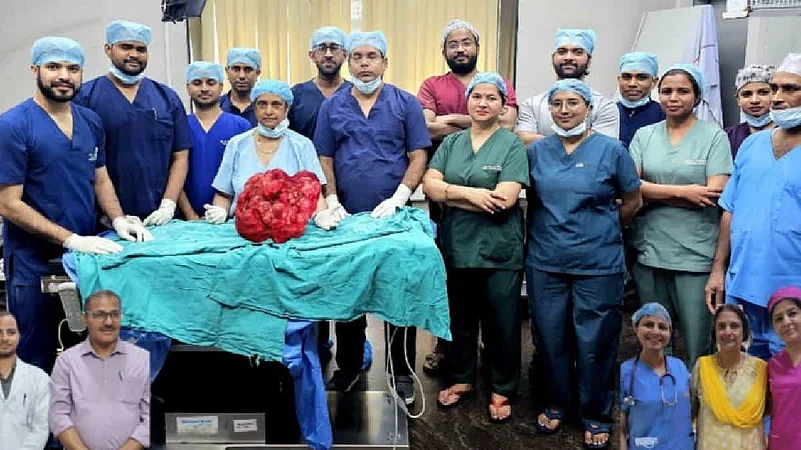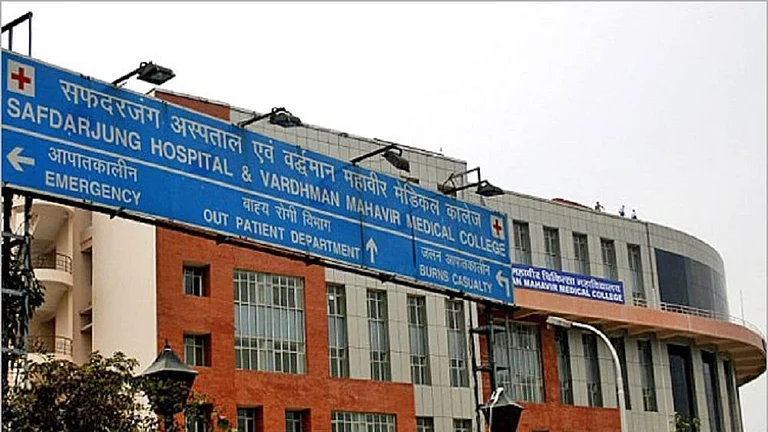For more than eight months, 65-year-old Sarita Sharma (name changed) endured excruciating abdominal pain, swelling, and increasing difficulty in movement. From one hospital to another, she searched for answers—but found none. Neither she nor the doctors she initially consulted could pinpoint the cause of her suffering. Relief finally came at Vardhman Mahavir Medical College (VMMC) and Safdarjung Hospital in the national capital, where a multidisciplinary team of doctors gave her more than just a diagnosis—they gave her a new lease on life.
In a remarkable medical feat, the doctors successfully removed a rare and life-threatening 10.6 kg gastrointestinal stromal tumour (GIST) from Sarita’s abdomen. The massive tumour had severely compromised her internal organs and posed a significant risk to her life.
GISTs are rare cancers originating in the digestive tract and arise from specialised pacemaker cells known as the interstitial cells of Cajal. Although uncommon, they are the most frequent mesenchymal tumours affecting the gastrointestinal system, as per the doctors.
The tumour in this case had grown to such a massive size that it engulfed the stomach and compressed several vital organs, including major blood vessels and kidney.
Dr. Sandeep Bansal, Director of VMMC and Safdarjung Hospital, said, “The surgery was extremely challenging because of the tumour’s size and its extensive involvement with nearby organs, including the omentum and bladder dome. The pressure it exerted on vital structures increased the complexity significantly.”
The surgery was led by Dr. Shivani B Paruthy and performed under the guidance of hospital Director Dr. Sandeep Bansal , Medical Superintendent Dr. Charu Bhamba, Head of Department Dr. Kavita, and Head of Department (Surgery) Dr. R.K. Chejara, with support from the anesthesia team comprising Dr. DS Meena, Dr. Sapna Batla, and Dr. Vishnu.
“The procedure required extraordinary surgical expertise due to the tumor's massive size and extensive attachment to multiple abdominal organs, omentum, and bladder dome, making it extremely difficult to retract and handle during the surgical process,” said Dr. Bansal. The successful operation was made possible through the wholehearted cooperation of dedicated surgery and anaesthesia residents, the first floor OT nursing staff, and OT In-charge Sister Rekha Gupta.
Following the complex procedure, Sarita has recovered well. “Such high-risk surgeries demand not just surgical precision but also exceptional coordination across multiple departments,” Dr. Bansal noted.
At the same time, Dr. Paruthi cautioned that GISTs often remain asymptomatic in their early stages, which can delay diagnosis and treatment. Symptoms, when they appear, may include abdominal pain, nausea, vomiting, or gastrointestinal bleeding—making early detection a persistent challenge.
The case also draws attention to a broader concern: the rising incidence of early-onset gastrointestinal cancers. A recent study published in the British Journal of Surgery by Oxford University Press noted an alarming uptick in such cases, particularly colorectal cancer, in younger adults.
The study attributed this trend to factors such as childhood obesity, Western diets, sedentary lifestyles, tobacco use, and alcohol consumption. It also underscored the psychological and social challenges faced by young cancer survivors, including higher rates of anxiety, depression, and reduced quality of life.
Reflecting on the case, Dr. Paruthi stressed the importance of raising public awareness and promoting early detection. “Timely diagnosis and lifestyle modifications are key to preventing the rise of gastrointestinal malignancies,” she said.



























